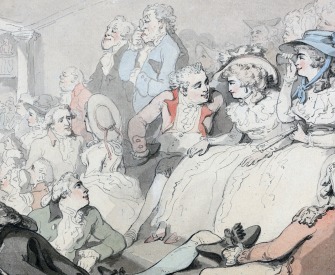A perfect tragedy should be arranged not on the simple but on the complex plan. It should moreover imitate actions which excite pity and fear, this being the distinctive mark of tragic imitation.
It follows plainly, in the first place, that the change of fortune presented must not be the spectacle of a virtuous man brought from prosperity to adversity: for this moves neither pity nor fear, it merely shocks us. Nor, again, that of a bad man passing from adversity to prosperity: for nothing can be more alien to the spirit of tragedy; it possesses no single tragic quality—it neither satisfies the moral sense nor calls forth pity or fear. Nor, again, should the downfall of the utter villain be exhibited. A plot of this kind would doubtless satisfy the moral sense, but it would inspire neither pity nor fear; for pity is aroused by unmerited misfortune, fear by the misfortune of a man like ourselves. Such an event, therefore, will be neither pitiful nor terrible. There remains, then, the character between these two extremes—that of a man who is not eminently good and just, yet whose misfortune is brought about not by vice or depravity, but by some error or frailty. He must be one who is highly renowned and prosperous.
A well-constructed plot should therefore be single in its issue, rather than double as some maintain. The change of fortune should be not from bad to good, but, reversely, from good to bad. It should come about as the result not of vice, but of some great error or frailty, in a character either such as we have described, or better rather than worse. The practice of the stage bears out our view. At first the poets recounted any legend that came in their way. Now, the best tragedies are founded on the story of a few houses—on the fortunes of Alcmaeon, Oedipus, Orestes, Meleager, Thyestes, Telephus, and those others who have done or suffered something terrible. A tragedy, then, to be perfect according to the rules of art, should be of this construction.
From the Poetics. The philosopher argued that a story’s action should take place in the course of one day, a device employed in Ulysses, Mrs. Dalloway, and each season of 24. A student of Plato and a teacher to Alexander the Great, Aristotle made contributions to most of the sciences; his observations of insects remained unmatched until the microscope’s invention in the 1600s.
Back to Issue



